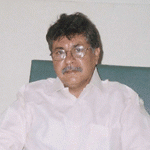-

-
Prof. Ahmed Usman
Prof. Ahmed Usman, Head of Clinical Oncology Department, Jinnah Post-graduate Medical Centre (JPMC), Karachi in an Interview spoke about the various aspects of cancer especially breast cancer. He was recently interviewed by Muhammad Fareed, Publisher & Managing Editor, Medical Review along with his team. Following are the excerpts of the Interview.
Q – Please tell us something about yourself.
Ans – I am the Head of the Department of Clinical Oncology since 1995. I did my MBBS from Sindh Medical College in 1979. Thereafter, I joined Oncology Department of JPMC in 1982. Clinical Oncology provides facilities of Radiation, Chemotherapy and supportive care both indoor and outdoor.
Q – What are the different cancers you encounter and which are more prevalent.
Ans – Being one of the oldest department in the country, we encounter every type of cancers. The most prevalent cancer in this region is head and neck cancers, breast cancer in female and lungs in male.
Q – What is the incidence of breast caner. Is there institutional record to know more about the incidence.
Ans – Incidence of any disease require population based studies which are not available. There is need for a comprehensive cancer registry at national level to exactly know the incidence of different diseases. However, institutional data are available which can provide some information about frequency of different cancers. Recently, Govern-ment of Pakistan has taken initiative in this regard and a plan for establishing a national cancer registry in under consideration.
Q – What is the level of treatment of cancer and breast cancer. What further facilities are needed to improve treatment.
Ans – For comprehensive cancer treatment multi-disciplinary approach is required, close liaison between surgeon, radiologist, pathologist and oncologist. For decision making of an individual patient can produce optional outcome. This is the need of the day and we are looking in this direction to organize regular tumour boards to improve the management strategies for our patients.
Q – There is need of awareness campaigns. In which areas and ways it can be augmented.
Ans – Yes, there is need for awareness campaign. This will help in identifying the patients at an earlier stage with better outcome.
Q – What is the role of Pharma companies in the creating awareness.
Ans. Pharmaceutical Industry can play a role in educating people about there healthcare but this campaign should be done with consultation with the authorities and healthcare professionals and should not be product related.
Q – Have awareness been introduced among women for breast cancer.
Ans – The government with the help of international NGOs has introduced some programs for early detection screening of breast cancers, but this program is in early phase and need to be expanded to make it within the reach of the maximum segment of the population. Individuals centre also arrange such programmes at community level within their area of influence.
Q – How is hormonal therapy effective in breast cancer treatment.
Ans – Hormonal manipulation is one of the treatment modalities for breast cancers.In the recent past, aromatase inhibitors have been added to the previously available anti-estrogen and now we have more flexibility in providing hormonal especially for post-menopausal women.
Q – When is preference given to hormonal therapy for breast cancer treatment.
Ans – It depends on the clinical assessment and expected treatment goals. Hormonal therapy is an important treatment tool in estrogen receptor positive patients and is comparatively less troublesome as far as the treatment side effects are concerned.
Q – What is the incidence of breast cancer in rural and urban areas.
Ans – At present, we don’t have exact figures for the incidence. But my feeling is that it is as common in rural as well as urban area.
Q – Are the students in medical colleges getting sufficient teaching in the subject of Oncology. If not then what do you suggest in improving the teaching standards.
Ans – Cancer is the upcoming challenge in most countries of world because it is major killer disease. The current curriculum is not sufficient enough to provide ample knowledge of disease to our future doctors, hence they are not capable enough to diagnose and treat these patients. Therefore it is suggested that curriculum may be revised and more teaching hours are allocated for it.
Q – The GPs have the role of referring cases to cancer hospitals when patients come to them. It is general impression this they do not effectively follow this practice. Do you agree and what can we do about it.
Ans – As we have already discussed, the GPs only realize this problem at a later stage. Due to financial constraints patients are not involved to undergo tests and are not inclined to undergo required diagnosis because of this factor patients referred are more often referred very late for specia-lized treatment.
Q – Anything you wish to add.
Ans – Pakistan is a resource constraint country. So our emphasis should be on the preventive side. There is a need to establish more therapy centres in the country at least in each district so that people can get appro-priate treatment at nearer place to their homes. This will improve the compliance and will reduce the financial burden of the poor rural population.
